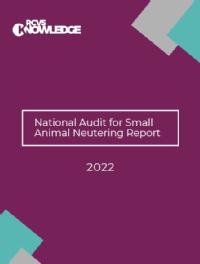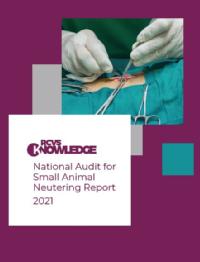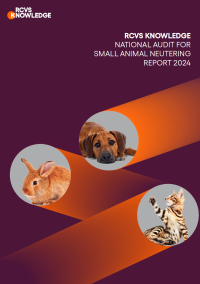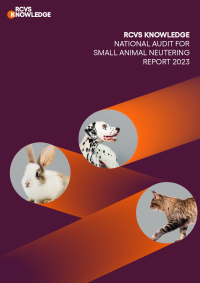NASAN Benchmark Report
The National Audit for Small Animal Neutering (NASAN) empowers veterinary teams with a straightforward yet powerful tool to track post-operative complication rates in neutering procedures.
By gathering donated data from practices across the country, NASAN creates a reliable system for measuring national benchmarks in canine, feline, and rabbit spays and castrations. Each year, this valuable data is carefully analysed and made publicly available, giving veterinary practices the opportunity to assess their own performance and compare their outcomes with the national standard.
On this page:
- 2024 Benchmark report
- 2023 Benchmark report
- 2022 Benchmark report
- 2021 Benchmark report
- From data to action: Practical tips for your next steps
2024 Benchmark report
This report presents data from 72,256 neutering procedures involving dogs, cats, and rabbits, carried out across the UK between 2005 and 2024.
We encourage you to share this report with your team, within your organisation, or on social media to help promote learning and improvement across the profession.
Using and citing this report
If you refer to this report or use any of its data, please cite it as:
RCVS Knowledge (2025). National Audit for Small Animal Neutering Report 2024. [Online]. Available at www.rcvsknowledge.org/NASAN-Report
This work is licensed under a Creative Commons Attribution-NonCommercial-NoDerivatives 4.0 International License, which means:
- You’re welcome to share it.
- You must give appropriate credit.
- You may not modify the content.
- You may not use it for commercial purposes.
2023 Benchmark report
This report is made up of data from 63,276 dog, cat, and rabbit neuters across the United Kingdom, performed and submitted from 2005 to 2023.
We encourage you to share this report with your team, within your organisation, or on social media to help promote learning and improvement across the profession.
Using and citing this report
If you refer to this report or use any of its data, please cite it as:
RCVS Knowledge (2024). National Audit for Small Animal Neutering Report 2023. [Online]. Available at www.rcvsknowledge.org/NASAN-Report/
This work is licensed under a Creative Commons Attribution-NonCommercial-NoDerivs 4.0 International, which means:
- You’re welcome to share it.
- You must give appropriate credit.
- You may not modify the content.
- You may not use it for commercial purposes.
2022 Benchmark report
 This report is made up of data from 53,695 dog, cat, and rabbit neuters across the United Kingdom, performed and submitted from 2005 to 2022.
This report is made up of data from 53,695 dog, cat, and rabbit neuters across the United Kingdom, performed and submitted from 2005 to 2022.
We encourage you to share this report with your team, within your organisation, or on social media to help promote learning and improvement across the profession.
Using and citing this report
If you refer to this report or use any of its data, please cite it as:
RCVS Knowledge. 2022. National Audit for Small Animal Neutering 2022 Benchmark Report. Available at: www.rcvsknowledge.org/NASAN-benchmark-2022/
This work is licensed under a Creative Commons Attribution-NonCommercial-NoDerivatives 4.0 International License, which means:
- You’re welcome to share it.
- You must give appropriate credit.
- You may not modify the content.
- You may not use it for commercial purposes.
2021 Benchmark report
 This report is made up of data from 45,379 dog, cat, and rabbit neuters across the United Kingdom, performed and submitted from 2005 to 2021.
This report is made up of data from 45,379 dog, cat, and rabbit neuters across the United Kingdom, performed and submitted from 2005 to 2021.
We encourage you to share this report with your team, within your organisation, or on social media to help promote learning and improvement across the profession.
Download infographic [PDF 913KB]
Using and citing this report
If you refer to this report or use any of its data, please cite it as:
RCVS Knowledge. 2022. National Audit for Small Animal Neutering 2021 Benchmark Report. Available at: www.rcvsknowledge.org/NASAN-benchmark-2021/
This work is licensed under a Creative Commons Attribution-NonCommercial-NoDerivatives 4.0 International License, which means:
- You’re welcome to share it.
- You must give appropriate credit.
- You may not modify the content.
- You may not use it for commercial purposes.
From data to action: Practical tips for your next steps
Benchmark results are a powerful tool for driving positive change in your practice. Here’s how to make the most of them:
1. Perform your own audit
Take part in the NASAN and see how your practice compares to national benchmarks. Conducting your own audit helps you:
- Identify areas for improvement.
- Measure the impact of changes over time.
- Support evidence-based decision-making.
2. Explore the NASAN Resource Hub
Visit the NASAN Resource Hub to access:
- Evidence-based articles
- Case studies and examples
- Practical tools and templates.
These resources can help you better understand your results and guide your Quality Improvement (QI) efforts.
3. Start a conversation with your team
Bring your results to your next team meeting and use them as a springboard for discussion.
- Use this poster to display your data and compare it with national benchmarks. It’s a great way to spark discussion and support your QI efforts. (PDF 73KB – published November 2022)
- Encourage open, constructive dialogue about what's working well and where improvements can be made.
Tip: The poster is designed for professional A2 printing and lamination. You can purchase a printed version from Service Print.
3. Share and celebrate your work
- You can share your ideas and improvements with your wider team, leadership or practice group to highlight your commitment to continuous improvement.
- Apply for the RCVS Knowledge Awards: If your audit or QI project has led to measurable improvements, consider submitting it to the RCVS Knowledge Awards to gain recognition and inspire others in the profession.
RCVS Knowledge would like to thank all practices that have submitted data. Without their participation, standards setting would not be possible.
If you require any further assistance with submitting data or you have any concerns or comments on this subject, please contact [email protected]

